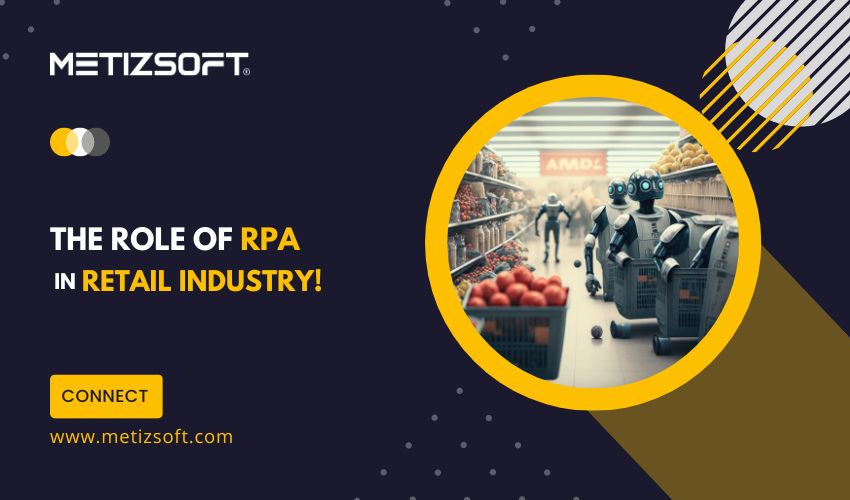
In recent years, retail has been one of the most prominent and growth-oriented sectors, especially in emerging markets. According to a Statista report for 2022, the global retail market generated over $27 trillion in sales and is forecasted to reach over $30 trillion by 2024. As opportunities continue to grow, the competition among different players rapidly increases
In contrast, players in the retail industry have been using newer technologies for retail automation. This helps smooth their processes and gain momentum to counter various challenges. They are also adopting innovative practices to attract and engage more customers. Industries, including retail, are increasingly adopting innovative technologies like Robotic Process Automation (RPA). They are doing it to manage their processes more accurately and productively beyond human capabilities.
In this informative blog post, we will explore the world of RPA in the retail industry. We will highlight the critical aspects of this advanced technology’s involvement in the retail mechanism. Consequently, the benefits it offers and meaningful use cases.
Table of Contents
RPA in Retail – What is it?
RPA in retail is what it is in customer service, banking and finance, and other industries in the rapidly evolving digital world. The goal remains the same for the emerging tech stacks – to automate the entire retail industry process and help merchants grow more.
RPA, a.k.a. robotic process automation, is a technology that automates repetitive and time-consuming tasks in the retail industry. This includes data collection, inventory tracking, and processing of simple customer returns.
Due to its ability to bring about significant changes, RPA has become widely adopted in the retail and eCommerce sectors. It enables business owners to automate and streamline various interactions between people, processes, and applications crucial to the success of retail strategies today.
How does RPA work in retail? – Work cycle!
In retail, RPA can automate back-office and customer-facing tasks involving defined, repetitive steps or manipulation of structured data. Typical applications of RPA in retail include the following:
- Gather the necessary information from employees for various back-office purposes such as onboarding, payroll processing, and scheduling.
- RPA-built applications help generate and process standard invoices.
- The chatbots answer common customer questions 24*7, 365 days.
- It saves ample time by quickly gathering and aggregating Register reports.
- The auto-reply mechanism sends automated messages/emails to customers and suppliers.
RPA’s role in the retail industry’s growth!
RPA simplifies the basic tasks, including product scanning, data analytics, and inventory management. It can also improve administrative processes, leading to benefits such as advanced auditability, better customer relationship management, cost reduction, increased productivity, and more. Some of the everyday yet result-driven RPA use cases include:
Supply Chain Management – The procure-to-pay process relies on precise data and the exchange of numerous documents. To make this process more efficient, retailers can create bots that extract data from supply chain management systems such as Oracle and SAP Ariba into standardized order forms. RPA bots are even capable of submitting orders through online portals.
Workflow Management – RPA can increase productivity in retail by facilitating HR processes such as workflow management, shift assignment, time tracking, sales auditing, payroll, leave management, and employee performance assessment.
Automated Return Processing – ECommerce companies face the challenge of managing product returns, which is time-consuming and costly. Robotic Process Automation (RPA) offers an efficient solution by handling returns, updating the inventory database, and customer billing.
Order Management – RPA can optimize the order-to-cash process by transferring information from e-commerce platforms, such as Shopify, to warehouse management systems, like Fishbowl, using unattended bots, resulting in faster order fulfillment.
ERP Management – ERP is the next big thing after automated inventory management. RPA automates tasks such as billing, generating reports, and managing employee vacancies. Automated ERP integrates inventory and sales, ensuring optimal resources for your organization.
Finance & Accounting – Previously, qualified professionals managed accounting and finance functions. However, technological advancements have led to the need for faster and more accurate processing. RPA has consolidated and reconciled transactions across departments and divisions, speeding up the process and reducing costs.
Marketing & Consumer Behaviour – RPA makes it easier and faster for retailers to determine marketing goals and budgets. It also helps identify areas for improvement. Furthermore, it allows for repetitive performance of past actions without manual effort. This enables the measurement of new strategies if adjusted based on analysis.
Return Processing – RPA simplifies returns by automating the process 24/7 with minimal human intervention. Intelligent chatbots and IVR technology guide the customer, while RPA bots update systems in the background.
Fraud Detection – Fraud prevention teams can utilize RPA bots to investigate suspicious orders. These bots can simultaneously check the current order against customer databases and other records. They leverage AI processing to identify any discrepancies that could indicate fraud.
Customer Support Management – Customer support is crucial to the retail industry, particularly in eCommerce. RPA can make this support quicker and more convenient, allowing for 24/7 support and real-time updates. The system tracks orders from placement to delivery, even collecting feedback after the sale.
Ways RPA helps the retail industry scale large!
RPA offers numerous benefits to both customers and employees. For employees, it allows them to focus on more meaningful and fulfilling tasks that can impact the organization more. This, in turn, leads to higher job satisfaction and increased productivity.
In the retail industry, RPA can bring several significant advantages and benefits, such as:
- Real-time RPA enhances the customer experience by enabling the on-demand execution of tasks like returns processing, order updates, and chat-based support.
- RPA can monitor inventory levels, notify teams of low inventory, and facilitate inventory management to prevent overstocking or undersupplying.
- RPA can analyze customer sentiment, purchases, and store transactions to inform strategic decisions about store planning, promotions, new products, and pricing.
- RPA can boost revenue by improving decision-making, planning, and customer experience, leading to repeat customers.
- RPA can complete tasks faster than humans, with fewer errors and lower costs.
Final Thoughts!
RPA has completely transformed retail business processes with its impactful use cases. This is evident in its ability to manage a massive stack of processes such as invoice processing, inventory management, and business analytics. Moreover, it has helped improve efficiency, increase customer satisfaction, and reduce the cost of most of the segments.
As a retailer, it’s high time to learn and understand RPA insights and implement them in the existing system if you still need to do so. You can Hire RPA Experts from a reliable RPA Development Company to do the job as soon as possible.
AboutManthan Bhavsar
Related Posts
Top 10 Impactful Benefits of Robotic Process Automation (RPA)!
From a buzz/trend to real-time implementation, Robotic Process Automation (RPA) has quickly become the primary asset of...
Robotic Process Automation (RPA) – Definition and Types!
Over the years, humans have been the driving force of all business. They still are, though, with the support of technological...

